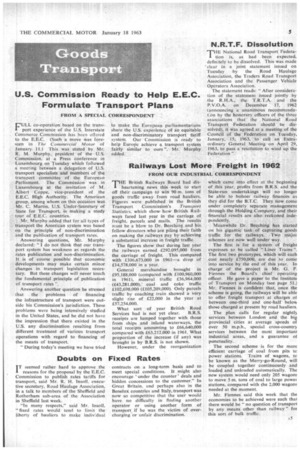Railways Lost More Freight in 1962
Page 7

If you've noticed an error in this article please click here to report it so we can fix it.
FROM OUR INDUSTRIAL CORRESPONDENT 'THE British Railways Board had dis
heartening news this week to start off their campaign to win 90 m. tons of goods traffic away from road hauliers. Figures were published in the British Transport Commission's Transport Statistics, which show how British Railways fared fared last year in the carriage of freight, parcels, and mails. The results must be a blow to Dr. Beeching and his fellow directors who are piling their faith on making the railways pay by achieving a substantial increase in freighttraffic.
The figures show that during last year the railways earned £292,095,000 from the carriage of freight. This compared with £306,673,000 in 1961—a drop of £14,578,000 in a year.
General merchandise brought in £95,188,000 (compared with £100,960,000 in 1961), mineral traffic £36,964,000 (£43,281,000),coal and coke traffic .£102,698,000 (£105,209,000). Only parcels traffic by coaching train showed a very slight rise of £22,000 in the year at £57,254,000.
What sort of year British Road
Services had is not yet clear. B.R.S. receipts are lumped together with those from ships and inland waterways, the total receipts amounting to £66,640,000 compared with £63,212,000 in 1961. What proportion of the increase (if any) was brought in by B.R.S. is not shown.
However, under the reorganization which came into effect at the beginning of this year, profits from B.R.S. and the State-run undertakings will no longer be able 'to bolster railway finances as they did Tor the B.T.C. They flow come under completely separate management • through the Holding Company, and their financial results are also reckoned inde pendently. .
..Meanvahile Dr. }leeching has Started on his gigantic task. of capturing goods traffic for the railways. • Two major sehemes are flaw well Under•way..
The first is for a systefn of freight expresses to . be called " Liner Trains The first two prototypes, which will each cost nearly £750,000, are due to come into service by the end of this year. In charge of .the project is Mr. G. F. Fiennes the Board's chief operating officer. He' gave a paper to the Institute of Transport on Monday (see page 5.1.) Mr. Fiennes is confident that, once the .scheme is going, the railways will be able to offer freight transport at charges of between one-third and one-half below those charged at present by road hauliers.
The plan calls for regular night1y services between London and the big provincial cities at average speeds of over 50 m.p.h., special cross-country services between the most important industrial areas, . and a guarantee of punctuality.
The second scheme is for the more efficient carriage of coal from pits to power stations. Trains of wagons, to be known as the Merry-go-Round, will be coupled together continuously and loaded and unloaded automatically, The new system would need only 205 wagons to move 5 m. tons of coal to large power stations, compared with the 2,000 wagons needed at the moment.
Mr. Fiennes said this week that the economies to be achieved were such that there would be "no question of transport by any means other than railway" fat this sort of bulk traffic.
































































































